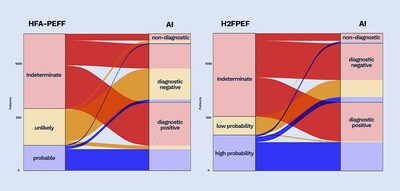Study Confirms Ultromics' AI Can Improve HFpEF Detection Using a Single Echocardiogram View
AI demonstrated high accuracy, reduced non-diagnostic outputs, and identified HFpEF patients with worse outcomes.
Applying AI to a single apical four chamber (A4C) view echocardiogram provides accurate information to detect heart failure with preserved ejection fraction (HFpEF), according to research published today in JACC Advances.1
The study, presented at the American Society of Echocardiography Annual Scientific Session, demonstrates the platform could improve the diagnosis, management, and outcomes of a condition that currently often goes undetected, or requires additional invasive procedures to confirm.

The study found AI could improve the diagnosis, management, and outcomes of HFpEF; a deadly form of heart failure that often goes undetected. (PRNewsfoto/Ultromics)

AI had fewer non-diagnostic outputs compared to HFA-PEFF and H2FPEF, correctly reclassifying 515 (73.5%) of patients and 571 (73.6%) of patients, respectively. (PRNewsfoto/Ultromics)
Ultromics' EchoGo® Heart Failure accurately detected HFpEF and provided fewer non-diagnostic outputs than current clinical scores, using just the routinely acquired A4C view from a transthoracic echocardiographic (TTE). The novel technology, which was recently granted clearance and Breakthrough Device designation by the FDA, identifies radiomic signatures of disease that are not evident to the human eye.
Senior study author, Patricia A. Pellikka, M.D, Vice Chair in the Department of Cardiovascular Medicine at Mayo Clinic, said: "HFpEF can be difficult to detect, but left undetected and untreated, can result in hospitalization and mortality. As the first AI platform cleared to detect the condition, EchoGo® Heart Failure can fill a significant unmet need."
"With more than 32 million people living with HFpEF, and the incidence increasing, clinicians will benefit from having another means to recognize this disease."
Based on the AI findings, patients could potentially be started on medications to treat their condition earlier than if they had to wait for an invasive diagnostic assessment of the disease.
The AI model was trained and developed on 6,756 patients who underwent a comprehensive TTE at Mayo Clinic in Rochester, Minnesota, between January 2009 to December 2020. It was then independently tested in geographically distinct areas within Mayo Clinic enterprise System sites across the United States, on a dataset that included 1,284 patients.
EchoGo® Heart Failure demonstrated high sensitivity and specificity, detecting 87.8% of patients who had HFpEF, and 81.9% of patients that did not.1 These results exceed what is usually observed in routine clinical practice.
It was also able to assign a correct diagnosis to 74% of patients who had returned non-diagnostic results on the commonly used HFA-PEFF and H2FPEF clinical scores.1 This improvement could translate to more patients receiving accurate and timely diagnoses and management.
During the follow-up period of up to 5 years, 444 patients died, highlighting the poor outcomes associated with HFpEF.1 The AI model was able to identify patients with worse survival, demonstrating its capacity to meaningfully improve patient outcomes.
Ross Upton, PhD, CEO and Founder of Ultromics, said: "Our research demonstrates the tremendous potential of AI in revolutionizing the detection of HFpEF. EchoGo® Heart Failure's exceptional discrimination capabilities combined with its ability to identify patients with higher mortality risks holds great promise for improving patient outcomes and enabling faster access to treatment."
"In a large number of cases, diagnostic data are often missing or discordant, making HFpEF detection challenging. AI can enhance echocardiography capabilities to help practices overcome the cumbersome intricacy of diastolic assessment. It is particularly useful for clinical centers that lack the time, resources, or expertise to perform comprehensive, diagnostic-quality, assessments."
By streamlining the screening process for this complex clinical syndrome, EchoGo® Heart Failure paves the way for more patients to receive the care they need sooner, potentially preventing more severe outcomes, and reducing HFpEF's significant burden on patients and healthcare.
Ultromics remains committed to advancing AI technology to transform cardiovascular healthcare. The groundbreaking findings from this study underscore the company's dedication to empowering healthcare professionals with tools that overcome existing bottlenecks and enhance patient care.
For more information on EchoGo® Heart Failure, visit Ultromics.com
Mayo Clinic has a financial interest in the technology referenced in this press release. Mayo Clinic will use any revenue it receives to support its not-for-profit mission in patient care, education and research.
The study was approved by the Institutional Review Boards of Mayo Clinic, USA and St. George's University Hospitals, NHS Foundation Trust, UK, and supported by a grant from the American Society of Echocardiography (ASE).
References:
1 - Akerman AP, Porumb M, Scott CG, et al. Automated Echocardiographic Detection of Heart Failure with Preserved Ejection Fraction using Artificial Intelligence. JACC Advances, 2023:100452.
About Ultromics:
Ultromics is a pioneer in advanced heart failure detection. The ground-breaking platform, EchoGo ®, is transforming the way heart failure is diagnosed using artificial intelligence and cardiac ultrasound as a modality. The technology empowers clinicians to make precise, efficient, and accurate assessments of heart failure, leveraging the largest known heart disease outcomes dataset in echocardiography, accurately interpreting echocardiograms and predicting cardiac outcomes. The technology has been built in collaboration with Mayo Clinic and NHS England, and has over $50 million raised capital to support continued innovation with the likes of Blue Venture Fund, Optum Ventures, Oxford Science Enterprises, and GV. They are backed by the largest US health insurance firms with 4 FDA clearances. Ultromics' mission is to stop heart failure in its tracks with its precision detection platform. https://www.ultromics.com































































































